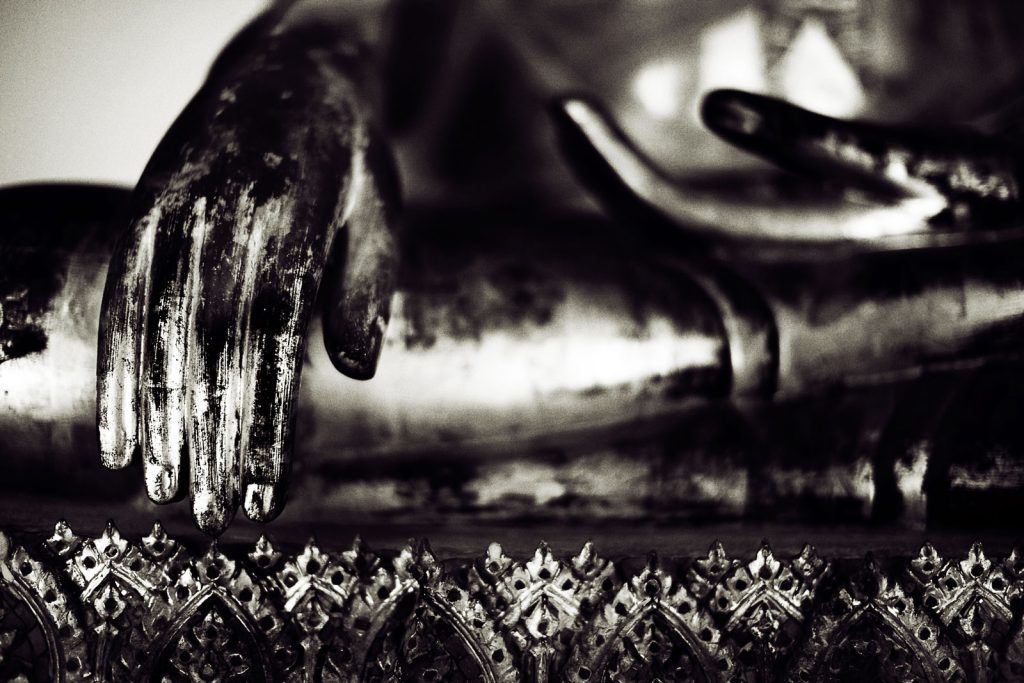To celebrate Black History Month, Tricycle revisits reflections, teachings, and essays by Black Buddhists through the years—from a 1994 article by acclaimed author and scholar bell hooks to a podcast interview with law professor and mindfulness teacher Rhonda Magee. Black practitioners, scholars, and teachers have long grappled with the legacy of racism in the US in general and in Buddhist spaces specifically. Some suggest that if we want to embody the dharma, free from our individual biases, we all must confront the ignorance and xenophobia that often go unaddressed in American Buddhism. These writers envision a future where the dharma is for all—not just in name, but in practice.
- A Vision of What Could Be
By Jan Willis
An African American professor of Buddhism recounts her journey to the dharma, and encourages sanghas to rethink their attitudes toward members of color. - Learning to See Our Racial Biases
With Rhonda Magee
Law professor and mindfulness instructor Rhonda Magee discusses her book The Inner Work of Racial Justice, and how we can heal by waking up to unacknowledged racial prejudice. - Waking Up to Racism
By bell hooks
In this article from Tricycle’s 1994 special section on Dharma, Diversity, and Race, acclaimed feminist scholar bell hooks considers the fraught historical relationship between colonialism and spiritual nourishment, and challenges ideas about who gets to be a “real Buddhist.” - Awakening to the Apocalypse
By Larry Ward
Modern day discourse is finally questioning the “colonial mind” that encouraged the exploitation of people categorized as other. How can we move forward from deconstruction to reconstruction—from trauma to resilience? - Why Are There So Many Black Buddhists?
By J. Sunara Sasser
What can other sanghas learn from Soka Gakkai International, a Nichiren sect that boasts a multi-racial community? - Love in Action
By Devin Berry
In an adaptation of one of his dharma talks, meditation teacher Devin Berry explains how the necessary next step after compassion is to put love into action, yet what this action entails depends on the individual. Whether that means reaching out to loved ones, supporting one’s self, or becoming politically engaged, Berry reminds us that it’s about “starting where you are with what you have.” - The Dharma of Social Transformation
By Charles Johnson
In a piece for our 2006 Winter Issue, polymath and Tricycle favorite Charles Johnson argues that in cutting the root of our own suffering, we can’t help but confront the suffering of society. - Buddhism and Our Ongoing Emancipation
By Dr. Kamilah Majied
Buddhist mental health therapist, clinical educator, researcher, and engaged consultant Dr. Kamilah Majied shares practices to engage with Black liberation, notice our interdependence, and release delusions of powerlessness. - The Shamatha of Survival
By Lama Rod Owen
A lama and author gives instructions for shamatha meditation and explains the role this practice has had for him in navigating prejudice in the world as a Black queer man. - Trusting the Unknown
By Kaira Jewel Lingo
A dharma teacher discusses the value of store consciousness and how some of the biggest mysteries in life can only truly be illuminated when letting go of the need for an answer. - Doubt Is My Best Friend
By Jessica Angima
A writer and healing artist reevaluates her relationship to the hindrances, realizing that “our only inheritance is impermanence and the truth that conditions will rise and fall.” - Making Friends with Yourself
By Kate Johnson
The author of Radical Friendship: Seven Ways to Love Yourself and Find Your People in an Unjust World offers a short meditation on making friends with our oldest, closest friend—the body.
This article was originally published on February 21, 2020 but has been updated to reflect more teachings.
Thank you for subscribing to Tricycle! As a nonprofit, we depend on readers like you to keep Buddhist teachings and practices widely available.
